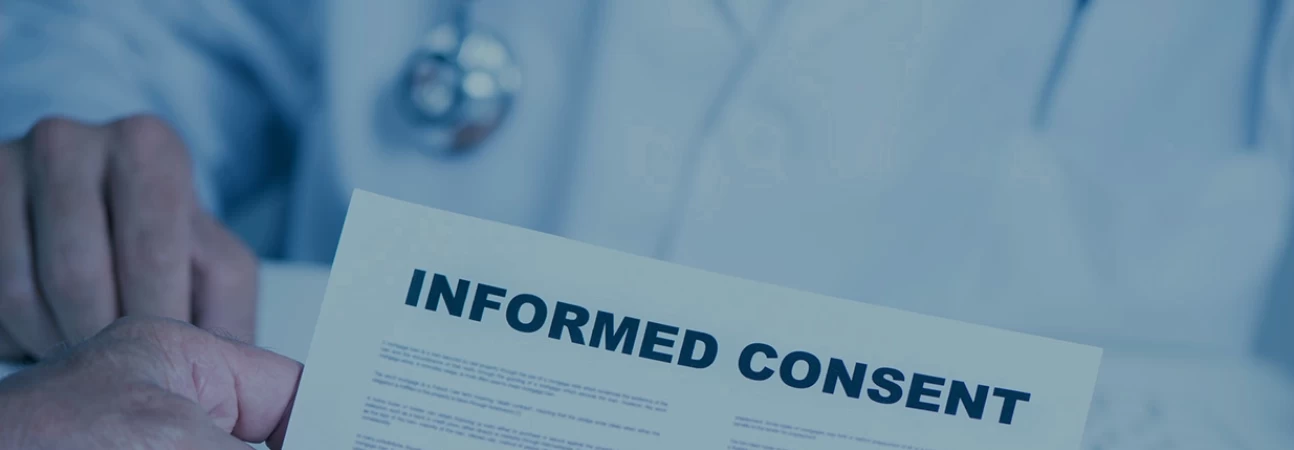CMS Updates Hospital Informed Consent Requirements
April 10, 2024
By: Brooke Bennett Aziere and Nancy E. Musick
In response to news reports describing the traditional practice of permitting medical students, advanced practice providers, or other students to perform pelvic exams on patients under anesthesia, the Centers for Medicare and Medicaid Services (“CMS”) issued a memo describing its revisions and clarifications to the Hospital Interpretive Guidelines for Informed Consent. CMS Memo, Revisions and Clarifications to Hospitals Interpretive Guidelines for Informed Consent, (Apr. 1, 2024) (the "Memo"). According to the Memo, the news reports confirmed that some hospitals and teaching programs were allowing students and residents to conduct pelvic examinations of unconscious patients for educational and training purposes without the patient’s informed consent. Patients later learned about the examinations, and some took to social media to express their frustration and warn others about this practice.
The Memo acknowledges that giving medical students appropriate educational opportunities is important but takes the position training and education cannot trump the patient’s right to make fully informed decisions about his or her health care. The Memo instructs surveyors to “ensure that a hospital’s patient informed consent policy and process, as well as its informed consent forms, contain elements and information to allow for a patient or his or her representative to make fully informed decisions about their care.” (emphasis in original).
Although the focus of the Memo is primarily on patient informed consent for exams conducted for educational and training purposes, CMS did not limit its revisions to its interpretive guidance in the State Operations Manual Appendix A to reflect its concern about this practice. The revised guidance at tag A-0955 (the new guidance is in bold) describes an element of a well-designed consent:
- Whether physicians other than the operating practitioner, including, but not limited to, residents, medical, advanced practice provider (such as nurse practitioners and physician assistants), and other applicable students, will be performing important tasks related to the surgery, or examinations or invasive procedures for educational and training purposes, in accordance with hospital’s policies. Important surgical tasks include: opening and closing, dissecting tissue, removing tissue, harvesting grafts, transplanting tissue, administering anesthesia, implant devices, and placing invasive lines. Examinations or invasive procedures conducted for educational and training purposes include, but are not limited to, breast, pelvic, prostate, and rectal examinations, as well as others specified under state law.
The revised guidance emphasizes that the patient needs to be fully informed in advance if any other provider (including non-physician practitioners and students) will be performing any tasks related to a medical procedure. The revisions are not limited to examinations or invasive procedures for educational purposes.
Some states have passed laws addressing this issue. For example, in 2023, Missouri passed a law that prohibits performance of a prostate, anal, or pelvic examination for purely educational purposes without patient consent. Mo. Rev. Stat. 191.240. Kansas has introduced similar legislation in the past, but has not passed a full ban on the practice.
Takeaways
Hospitals should be mindful of this new guidance and examine their existing policies and procedures, as well as their informed consent forms, to ensure that they comply with CMS’s new guidance. According to the Memo, a valid informed consent form must contain, at a minimum, these items:
- Name of the hospital where the procedure or treatment is taking place.
- The specific procedure, or medical treatment, for which the patient is giving consent.
- Name of the practitioner responsible for performing the procedure or administering the medical treatment.
- Statement that the procedure or treatment, including the anticipated benefits, material risks, and alternatives, was explained to the patient.
- The patient’s (or their legal representative’s) signature.
- Date and time the informed consent was signed.
- Any additional requirements imposed by state law.
The Memo also describes some other elements of a “well-designed” informed consent, including (1) the name of the practitioner who conducted the informed consent discussion with the patient; (2) witness signature, with date and time; (3) list of material risks that were discussed with the patient; (4) statement that other physicians, including residents, will be performing important tasks related to the procedure, under the supervision of the responsible practitioner, if applicable; and (5) statement that qualified non-physician practitioners will perform tasks consistent with their scope of practice under the supervision of the responsible practitioner, if applicable.
CMS’s guidance is in effect immediately. Hospitals should review their informed consent policies, process, and forms as soon as possible to ensure that they are in compliance with CMS’s new guidance. It is not sufficient to have a patient’s signature on an informed consent form. Hospitals need to ensure that their patients really understand the process and their rights to make decisions regarding their health care.
For More Information
If you have questions or want more information regarding CMS's new guidance for informed consent, contact your legal counsel. If you do not have regular counsel for such matters, Foulston Siefkin LLP would welcome the opportunity to work with you to meet your specific needs. For more information, contact Brooke Bennett Aziere at 316.291.9768 or baziere@foulston.com or Nancy E. Musick at 913.253.2140 or nmusick@foulston.com. For more information on the firm, please visit our website at www.foulston.com.
Established in 1919, Foulston Siefkin is the largest Kansas-based law firm. With offices in Wichita, Kansas City, and Topeka, Foulston provides a full range of legal services to clients in the areas of administrative & regulatory; antitrust & trade regulation; appellate law; banking & financial services; business & corporate; construction; creditors’ rights & bankruptcy; e-commerce; education & public entity; elder law; employee benefits & ERISA; employment & labor; energy; environmental; ERISA litigation; estate planning & probate; family business enterprise; franchise & distribution; government investigations & white collar defense; governmental liability; government relations & public policy; healthcare; immigration; insurance regulatory; intellectual property; litigation & disputes; long-term care; mediation/dispute resolution; mergers & acquisitions; Native American law; oil, gas & minerals; OSHA; privacy & data security; private equity & venture capital; product liability; professional malpractice; real estate; renewable energy, storage, and transmission; securities & corporate finance; startup/entrepreneurship; supply chain management; tax-exempt organizations; taxation; trade secret & noncompete litigation; and water rights.
Additional Resources
Sign up to receive Foulston's issue alerts straight to your inbox here.
This update has been prepared by Foulston Siefkin LLP for informational purposes only. It is not a legal opinion; it does not provide legal advice for any purpose; and it neither creates nor constitutes evidence of an attorney-client relationship.






